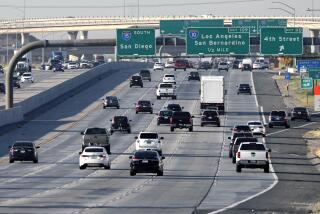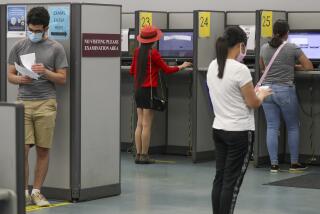Bad Driving Is Contagious
- Share via
Science says you can inherit your father’s brown eyes, your mother’s red hair or your uncle’s big feet. But is it possible to pick up your parents’ penchant for nasty, fist-waving freeway rants?
There is no proof yet of a gene for volatile driving, but a new study from the California Institute of Transportation Safety suggests that adult drivers can pass on their bad driving habits and even a tendency toward road rage.
Parents are more likely than driving instructors to teach their teenagers the rules of the road. And the study found that Mom and Dad could be sending mixed signals. Sure, they might give rational advice during parking lot training sessions. But the kids are more likely to absorb cues from those long hours on the road, when many parents routinely lose their cool.
“Young drivers are at risk of picking up bad habits of their parent/guardians that might adversely affect their driving choices and attitudes,” said the study from the institute at San Diego State.
In short, some parents may be trying to teach their teenagers to “drive as I say, not as I do.”
Professor Sheila Sarkar, the study’s lead investigator and an expert on aggressive driving habits, said the conclusions are worrisome because teenagers are already at high risk of dying in traffic accidents.
“Youngsters feel that if their parents get away with it, why shouldn’t I?” she said.
Teenagers make up 6.7% of the nation’s driving population, but they are involved in 14% of traffic fatalities. In fact, traffic accidents are the leading cause of death among American teenagers.
The study urged parents to “reevaluate their driving styles, particularly when children and teenagers are present.”
To combat bad driving habits among teenagers, Sarkar developed a series of driver training workshops called “The Cool Operator Program.” Last year, the first for the program, 250 teenagers attended the workshops in the San Diego area.
In a survey of those teenagers, Sarkar’s study found that nearly 60% felt their parents could benefit from the workshop. An additional 7.5% said their parents were beyond hope.
The teenagers said their fathers were more aggressive drivers than their mothers. Many of the students dubbed their dads “road warriors,” while moms were more often described as being in a hurry or distracted.
The theory that driving habits are passed from generation to generation made sense to some of the young people applying for licenses recently at the Department of Motor Vehicles office in Hollywood.
Eli Burkhardt, 16, a New York resident who is spending the summer in Los Angeles, said he believes his parents helped shape his careful style behind the wheel.
“My parents are not too interesting when they drive,” he said as he waited outside the DMV office after applying for his license. “They are pretty good drivers.”
Burkhardt wondered if teenagers will use the study’s findings--and their parents’ bad driving habits--as an excuse to drive like maniacs themselves.
“I don’t think teenagers are good drivers anyway,” he said.
Ben Weil, 18, said he thinks he has picked up the driving habits of both his parents. He said his father is an aggressive driver. “He barely looks in the mirror,” Weil said. But he said his mother is overly cautious. Weil said he falls somewhere in between.
But perhaps the best example of driving habits being passed between parent and child is Lyniel Cueto, a 17-year-old from Los Angeles who describes his mother and father as “very confident drivers.”
Cueto said he, too, is a confident driver. So confident, in fact, that he was not discouraged when he failed his driving test at the Hollywood DMV for the fourth time.
“I’m going to take the test in Glendale,” Cueto said after the DMV examiner gave him the bad news. “They are not as strict there.”
But there is some good news on the driving front, at least for Southern Californians.
A survey by the mid-Atlantic chapter of the Automobile Club concluded that the most aggressive drivers in the country are not found in Los Angeles. This is despite the mayhem that seems to unfold on Southland freeways every day.
The nation’s most aggressive drivers are in Boston, which received an F from AAA.
AAA surveyed 1,000 drivers in eight major U.S. cities, including Los Angeles. In Boston, 66% of those surveyed rated their city as an unsafe place to drive, compared to 37% nationally.
More than half those surveyed in Boston said their fellow drivers were more rude than drivers in other cities. Bostonians were more likely than their national counterparts to flash their high beams (14% compared to 9%), make rude gestures (13% to 9%), drive over the speed limit (70% to 55%), honk their horn (41% to 29%) or talk on a cellular phone while driving (46% to 39%).
In contrast, AAA gave Los Angeles drivers a C rating.
Most L.A. motorists consider using a cell phone while driving to be an act of aggressive driving. But 45% admitted they had done so.
And Los Angeles motorists were more likely than drivers elsewhere to merge at the last minute (19% compared to 11% nationwide). Maybe that’s because they’re talking on their cells phones and not paying attention to their exit.
*
If you have questions or comments on driving in Southern California, send an e-mail to behindthewheel@latimes.com
(BEGIN TEXT OF INFOBOX / INFOGRAPHIC)
Are You an Aggressive Driver?
If you engage in the following activities regularly and you don’t think your behavior is a problem, you are an out-of-control driver.
* Blocking crosswalks at traffic signals.
* Speeding through intersections when the light turns yellow.
* Not yielding to pedestrians and bicyclists at crosswalks.
* Driving on the sidewalk.
* Speeding through areas where pedestrians and children may be present.
* Weaving or changing lanes rapidly, using merging lanes or the roadway shoulder to avoid delays.
* Merging without observing the rules.
* Not yielding to drivers who have adequately indicated their intention to merge or turn.
You may provoke violence from fellow drivers if you engage in the following behavior:
* Excessive speeding along with other unsafe activities such as tailgating and weaving through traffic.
* Excessive speeding in areas where construction work is going on, or where children are present.
* Running red lights or stop signs, making illegal turns.
Source: California Institute for Transportation Safety
More to Read
Sign up for Essential California
The most important California stories and recommendations in your inbox every morning.
You may occasionally receive promotional content from the Los Angeles Times.














